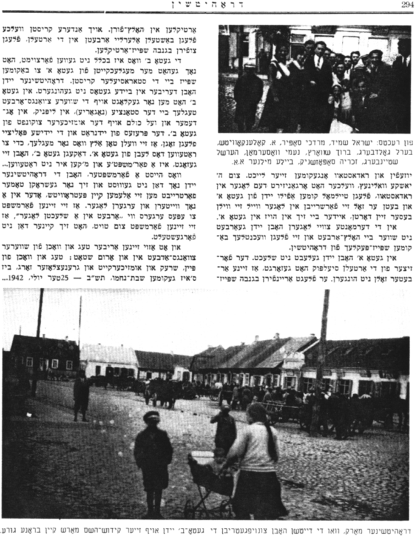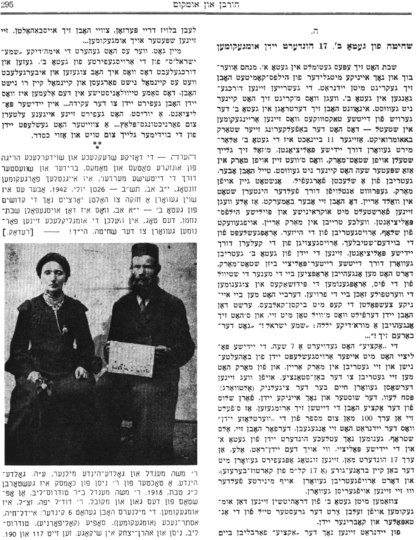
[Page 294]
There were Jews in Ghetto A who would frequently approach Yoshka Volinetz, the organizer of the Radestov camp, to request being assigned to the camp because they preferred being there than in their own homes in Ghetto A. In the aforementioned two camps, the Jews didn't work very hard in lumber work, and every week they would food packages from Drohitchin.
Jews didn't live so badly in Ghetto A. The chairman of the workshops, Sielpuk, made sure his workers didn't go hungry and smuggled in food in lumber wagons. Other Christians who did all types of work in the workshops also smuggled in food products.
Ghetto B was not fenced in, and still had a greater possibility to obtain food from Starosilia Christians. Drohitchin Jews therefore didn't starve in either ghetto, though in Ghetto B people complained about the hard forced labor at the Nagoria station, in Lipnik, and especially about the uncertain future of Ghetto B. The head of the Judenrat and the Jewish police would say that they would do everything possible to save Ghetto A. As far as Ghetto B was concerned, they said that it was already sentenced, and it was impossible to save it. At that time the Jews in Drohitchin still didn't know what was meant by Ghetto B being sentenced, but they all feared being sent away to Petrovich or some other worse camp further away. They could never imagine that if they were “sentenced” to work in a “bad camp,” they were sentenced to death.
So this was the way life was for days and weeks of forced labor in and around town. Days and weeks of torture, fear, insecurity and unlimited worry, until the day of July 25, 1942 arrived.
[photo:] From right: Yisrael Schmid, Mordechai Sapir, A Kalenkovitch, Berl Goldberg, Baruch Schwartz, Naomi Wasserman, Hershel Steinberg, Zechariah Sapozhnik, Beila Milner and others.
[photo:] The Drohitchin market, where the Germans gather everyone from Ghetto B together for the Death March to Brona Gora.

[Page 295]
5.
Slaughter of Ghetto B, 1,700 Jews perished
Something was going on the Sabbath in Ghetto A. Menachem Averbuch and a few other members of the Aid Committee met with the Judenrat. The yelling could be heard in Ghetto B, but no one knew what they were arguing about. In the evening, the faint noise of German cars coming into town could be heard in Ghetto B, and badly worried the people there. At 11 pm the Jewish police announced throughout Ghetto B that everyone had to proceed to the town market, though no one knew what was going to happen an hour later. Some, however, had bad premonitions, and instead of going out to the market, they tried to escape through fields behind town and get into the forest. However, they found that all paths out had Ukrainian and Polish police assistants together with Jewish policemen pushing everyone out of the houses, attics and cellars toward the city market under the watch of German police on horseback. Then they removed boots off of the feet of the Jews, their coats, and any valuables the women were carrying, and even struck a few over the head with the butts of their guns. The Jews then realized what was happening to them, and started to mournfully recite “Hear O Israel” [Shma Yisrael] and “G-d, have pity!”
The aktsia lasted for seven hours. The Jewish police zealously pulled people out of hiding, and took them to the market area, from where they were herded to the train station. Along the way, Chaim Ber Altvarg the watchmaker was killed, as were Pesach Lev the tailor and a few others. At the end of the aktsia, the Germans found that approximately 100 men of the “worthless Jews” whose names appeared on the Judenrat list were missing, so as punishment, they took a few hundred Jews from Ghetto A, the Jewish police and the Judenrat. On Sunday all of them, 1,700 people were taken by train to Brona Gora (17 kilometers from Kartuz-Bereza), and put them into open ditches, where they were all blown up.
The majority of Jews from Antapole and Kobrin were killed at the same place together with Drohitchin Ghetto B. Of the Judenrat, only three people remained alive during that aktsia. Two were in hiding, and they perished later.
My G-d, whoever heard the awesome recitation of “Hear O Israel” from the expelled people of Ghetto B, and saw and experienced what I saw and experienced, would never forget it and never know any peace. The most fiendish thing about it all was how Jews led other Jews to be sacrificed. A Jewish policeman and a lawyer led their own parents to the extermination spot. Another dragged Jews from the attics right to their deaths, and other such events took place regularly.
Note: This frightening and horrible massacre of our parents and siblings at the hands of the German murderers actually took place on Av 12, 5702/July 26, 1942, but we have the custom to observe the yahrzeit [death anniversary] on the 11th of Av, which that year was the Sabbath following the fast day of the Ninth of Av, as the time when those hapless Jews were taken to the slaughter. May G-d avenge their blood! [Editor]
[Photo:] R. Moshe Mendel and Golda Hinda Milner. Golda Hinda, a daughter of R. Nisan of Khomsk, died on January 7, 1918. R. Moshe Mendel, son of R. Tordos Leib, and descended from Rabbi Dovidel Yaffe, perished. The Milners had six children: Eidel-Chaya, Esther-Necha (perished), Sofia (California), Tordos-Leib, Nisan and Aharon Yitzchak in Chicago. See pp. 117 and 190.
Previous Page |
Next Page
JewishGen, Inc. makes no representations regarding the accuracy of
the translation. The reader may wish to refer to the original material
for verification.
JewishGen is not responsible for inaccuracies or omissions in the original work and cannot rewrite or edit the text to correct inaccuracies and/or omissions.
Our mission is to produce a translation of the original work and we cannot verify the accuracy of statements or alter facts cited.
 Drogichin, Belarus
Drogichin, Belarus
 Yizkor Book Project
Yizkor Book Project
 JewishGen Home Page
JewishGen Home Page
Copyright © 1999-2024 by JewishGen, Inc.
Updated 19 Dec 2001 by LA